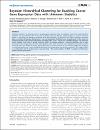Particle swarm clustering fitness evaluation with computational centroids
View/
Publisher version (Check access options)
Check access options
Date
2017Metadata
Show full item recordAbstract
In this paper, we propose a new way to carry out fitness evaluation in dynamic Particle Swarm Clustering (PSC) with centroid-based encoding. Generally, the PSC fitness function is selected among the clustering validity indices and most of them directly depend on the cluster centroids. In the traditional fitness evaluation approach, the cluster centroids are replaced by the centroids proposed by a particle position. We propose to first compute the centroids of the corresponding clusters and then use these computational centroids in fitness evaluation. The proposed way is called Fitness Evaluation with Computational Centroids (FECC). We conducted an extensive set of comparative evaluations and the results show that FECC leads to a clear improvement in clustering results compared to the traditional fitness evaluation approach with most of the fitness functions considered in this study. The proposed approach was found especially beneficial when underclustering is a problem. Furthermore, we evaluated 31 fitness functions based on 17 clustering validity indices using two PSC methods over a large number of synthetic and real data sets with varying properties. We used three different performance criteria to evaluate the clustering quality and found out that the top three fitness functions are Xu index, WB index, and Dunn variant DU23 applied using FECC. These fitness functions consistently performed well for both PSC methods, for all data distributions, and according to all performance criteria. In all test cases, they were clearly among the better half of the fitness functions and, in the majority of the cases, they were among the top 4 functions. Further guidance for improved fitness function selection in different situations is provided in the paper.
Collections
- Electrical Engineering [2850 items ]
Related items
Showing items related by title, author, creator and subject.
-
Training Radial Basis Function Neural Networks for Classification via Class-Specific Clustering
Raitoharju, Jenni; Kiranyaz, Serkan; Gabbouj, Moncef ( Institute of Electrical and Electronics Engineers Inc. , 2016 , Article)In training radial basis function neural networks (RBFNNs), the locations of Gaussian neurons are commonly determined by clustering. Training inputs can be clustered on a fully unsupervised manner (input clustering), or ... -
A novel Conceptual Machine Learning Method using Random Conceptual Decomposition
Ali M.A.; Jaoua A.; Al-Maadeed, SomayaA. ( Institute of Electrical and Electronics Engineers Inc. , 2020 , Conference)Formal Concept Analysis (FCA) is emerging in Data Science because of its generality, simplicity, and powerful mathematical foundation. It enabled a uniform data clustering methods into structured space of formal concepts. ... -
Bayesian Hierarchical Clustering for Studying Cancer Gene Expression Data with Unknown Statistics
Sirinukunwattana, Korsuk; Savage, Richard S.; Bari, Muhammad F.; Snead, David R.J.; Rajpoot, Nasir M. ( Public Library of Science , 2013 , Article)Clustering analysis is an important tool in studying gene expression data. The Bayesian hierarchical clustering (BHC) algorithm can automatically infer the number of clusters and uses Bayesian model selection to improve ...



